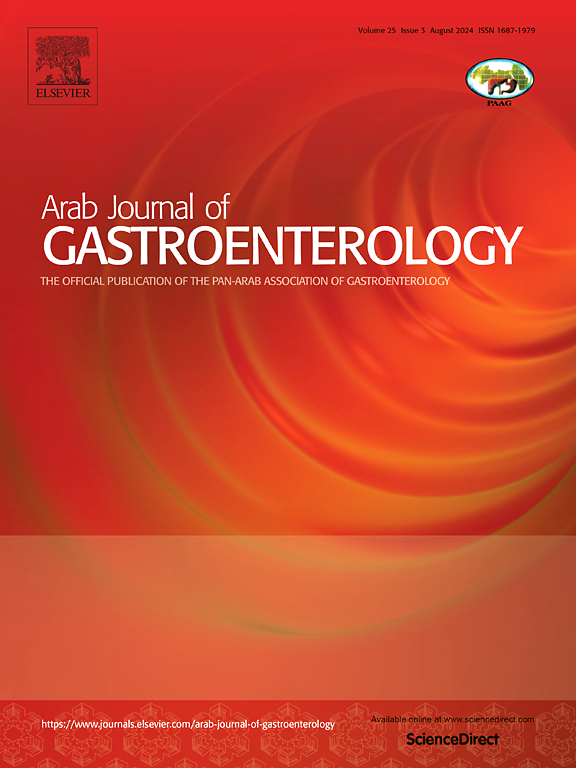胃食管瓣瓣异常:复发性静脉曲张出血的预测因子。
IF 1.1
4区 医学
Q4 GASTROENTEROLOGY & HEPATOLOGY
引用次数: 0
摘要
背景与研究目的:食管静脉曲张出血受多种危险因素影响。我们假设胃食管瓣(GEFV)异常患者胃酸暴露增加可能会增加食管静脉曲张出血。本研究的目的是探讨GEFV与食管静脉曲张出血发作的关系。患者和方法:在这项横断面研究中,纳入了连续300例食管胃十二指肠镜检查中伴有食管静脉曲张和有记录的GEFV的患者。根据皮瓣瓣的Hill分级(1、2级正常,3、4级异常)、静脉曲张大小(大(> ~ 5mm)和小(结果:224例(74.60%)正常,76例(25.40%)异常)分为两组。结论:GEFV异常、EVL病史、大静脉曲张是食管静脉曲张出血复发的独立危险因素。本文章由计算机程序翻译,如有差异,请以英文原文为准。
Abnormal gastroesophageal flap valve: A predictor of recurrent variceal hemorrhage
Background and study aims
Esophageal variceal bleeding is affected by various risk factors. We hypothesized that increased exposure to gastric acid in patients with abnormal gastroesophageal flap valve (GEFV) might increase esophageal variceal bleeding. The aim of this study is to investigate the relationship between GEFV and esophageal variceal bleeding episodes.
Patients and methods
In this cross-sectional study, 300 consecutive patients with esophageal varices and a documented GEFV during esophagogastroduodenoscopy were included. Patients were divided into two groups according to: the Hill’s grade of flap valve (grade 1,2- normal and grade 3,4- abnormal), size of varices − large (>5 mm) and small (<5 mm) and the number of bleeding episodes into: Group A with ≤ 1 and Group B with ≥ 2 bleeding episodes. We compared GEFV and various other factors to the number of variceal bleeding episodes.
Results
224 patients (74.60 %) had a normal and 76 (25.40 %) had an abnormal GEFV. Clinical variables were statistically significant in the abnormal GEFV group (P < 0.0.5). Propensity score matching was done to reduce the significant differences in the clinical background at baseline between the 2 groups. 152 patients (76 in each group) were analysed after propensity score matching. A significant difference between the two groups disappeared except for number of bleeding episodes. Binary logistic Cox regression analysis was applied using the clinical variables to assess their role in predicting recurrent variceal bleeding. On univariate analysis, abnormal GEFV and large varices were significantly associated with recurrent esophageal variceal bleed (P = 0.001). On Multivariate analysis, abnormal GEFV (OR 7.25, 95 % CI 3.27– 16.08, P = 0.001), History of EVL (OR 6.21, 95 % CI 1.98– 12.22, P = 0.03) and large varices (OR 5.70, 95 % CI 2.45– 13.20, P = 0.001) were independent predictors for recurrent esophageal variceal bleeding.
Conclusion
Abnormal GEFV, History of EVL and large varices are independent risk factors for recurrent esophageal variceal haemorrhage.
求助全文
通过发布文献求助,成功后即可免费获取论文全文。
去求助
来源期刊

Arab Journal of Gastroenterology
Medicine-Gastroenterology
CiteScore
2.70
自引率
0.00%
发文量
52
期刊介绍:
Arab Journal of Gastroenterology (AJG) publishes different studies related to the digestive system. It aims to be the foremost scientific peer reviewed journal encompassing diverse studies related to the digestive system and its disorders, and serving the Pan-Arab and wider community working on gastrointestinal disorders.
 求助内容:
求助内容: 应助结果提醒方式:
应助结果提醒方式:


